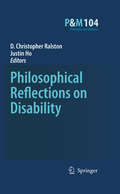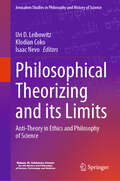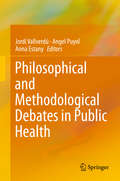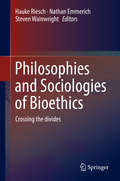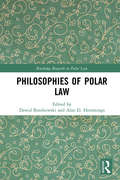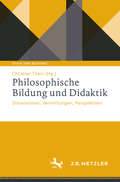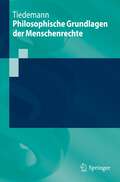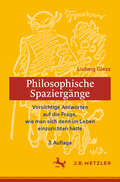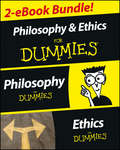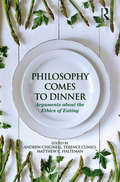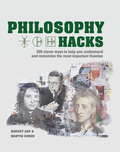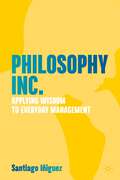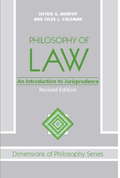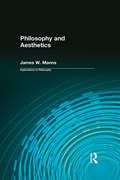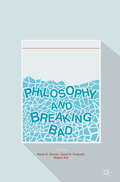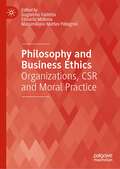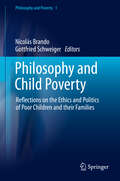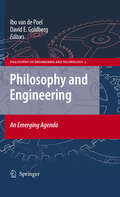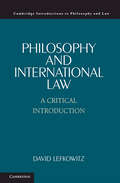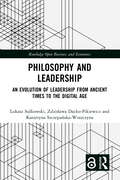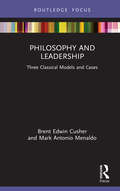- Table View
- List View
Philosophical Reflections on Disability
by D. Christopher Ralston Justin HoThis project draws together the diverse strands of the debate regarding disability in a way never before combined in a single volume. After providing a representative sampling of competing philosophical approaches to the conceptualization of disability as such, the volume goes on to address such themes as the complex interplay between disability and quality of life, questions of social justice as it relates to disability, and the personal dimensions of the disability experience. By explicitly locating the discussion of various applied ethical questions within the broader theoretical context of how disability is best conceptualized, the volume seeks to bridge the gap between abstract philosophical musings about the nature of disease, illness and disability found in much of the philosophy of medicine literature, on the one hand, and the comparatively concrete but less philosophical discourse frequently encountered in much of the disability studies literature. It also critically examines various claims advanced by disability advocates, as well as those of their critics. In bringing together leading scholars in the fields of moral theory, bioethics, and disability studies, this volume makes a unique contribution to the scholarly literature, while also offering a valuable resource to instructors and students interested in a text that critically examines and assesses various approaches to some of the most vexing problems in contemporary social and political philosophy.
Philosophical Theorizing and its Limits: Anti-Theory in Ethics and Philosophy of Science (Jerusalem Studies in Philosophy and History of Science)
by Uri D. Leibowitz Klodian Coko Isaac NevoThis book brings together scholars from ethics and philosophy of science in order to identify ways in which insights gleaned from one subfield can shed light on the other. The book focuses on two radical Anti-Theory movements that emerged in the 1970’s and 1980’s, one in philosophy of science and the other in ethics. Both movements challenged attempts to supply general, systematized philosophical theories within their domains and thus invited the reconsideration of what philosophical theorizing can and should offer. Each of these movements was domain-specific – that is, each criticized the aspirations to philosophical theories within its own domain and advanced arguments aimed at philosophers within their own specific subfield. The innovative systematic comparative examination of these movements by scholars from each domain sheds new light on some familiar debates, offers new and exciting paths of research to pursue in each domain, provides insight into the place of science and ethics in contemporary life and culture, and enables a fresh view on the longstanding and alluring philosophical aspiration for a fully general, absolute theory of reality and an ultimate objective foundational theory of knowledge.
Philosophical and Methodological Debates in Public Health
by Jordi Vallverdú Angel Puyol Anna EstanyThis interdisciplinary volume gathers selected, refereed contributions on various aspects of public health from several disciplines and research fields, including the philosophy of science, epidemiology, statistics and ethics. The contributions were originally presented at the 1st Barcelona conference of “Philosophy of Public Health” (5th – 7th May 2016). This book is intended for researchers interested in public health and the contemporary debates surrounding it.
Philosophies and Sociologies of Bioethics: Crossing the divides
by Nathan Emmerich Hauke Riesch Steven WainwrightThis book is an interdisciplinary contribution to bioethics, bringing together philosophers, sociologists and Science and Technology Studies researchers as a way of bridging the disciplinary divides that have opened up in the study of bioethics. Each discipline approaches the topic through its own lens providing either normative statements or empirical studies, and the distance between the disciplines is heightened not only by differences in approach, but also disagreements over the values, interpretations and problematics within bioethical research. In order to converse across these divides, this volume includes contributions from several disciplines. The volume examines the sociological issues faced by interdisciplinary research in bioethics, the role of expertise, moral generalisations, distributed agency, and the importance of examining what is not being talked about. Other contributions try to take an interdisciplinary look at a range of specific situations, fetal alcohol syndrome in the media, citizen science, electronic cigarettes and bioethical issues in human geography.
Philosophies of Polar Law (Routledge Research in Polar Law)
by Dawid BunikowskiAnalysing the most important concepts and problems of the philosophy of polar law, this book focuses on the legal regimes relating to both the Arctic and Antarctic. The book addresses the most fundamental concepts and problems of polar law, looking beyond the apparent biophysical similarities and differences of the two polar regions, to tackle the distinctive legal problems relating to each polar region. It examines key legal–philosophical areas of the philosophy of law around legal interpretation; the role of nation states, reflected in concepts of territorial sovereignty – whether recognised or merely asserted, the exercise of jurisdiction, and the philosophical justifications for such claims; as well as indigenous rights, land rights, civil commons and issues of justice. The book will be of interest to students and scholars of polar law, land law, heritage law, international relations in the polar regions and the wider polar social sciences and humanities.
Philosophische Bildung und Didaktik: Dimensionen, Vermittlungen, Perspektiven (Ethik und Bildung)
by Christian TheinDie Beiträge dieses Bandes betrachten die Verbindung zwischen bildungsphilosophischen und philosophiedidaktischen Themen. So werden im ersten Teil "Philosophie und Bildung" aus der Philosophie heraus Konzepte und Ideen entwickelt, die für theoretische und praktische Fragen der Bildung von Relevanz sind. Der zweite Teil enthält Beiträge, die das besondere Verhältnis von philosophischer Bildung und Philosophiedidaktik in den Blick nehmen. Der dritte Themenblock schlägt dann die Brücke von den fachdidaktischen Konzepten und Ideen in den konkreten Unterricht: Philosophiedidaktik und philosophische Unterrichtspraxis.
Philosophische Grundlagen der Menschenrechte (Springer-Lehrbuch)
by Paul TiedemannDieses Lehrbuch stellt zunächst eine Reihe von klassischen philosophischen Ansätzen vor, um zu zeigen, dass sie als Grundlage für die Menschenrechte ungeeignet sind. Nur das Konzept der Menschenwürde - basierend auf der kantischen Unterscheidung von Preis und Würde – ist als Grundlage geeignet. Die Ableitung der Menschenrechte aus dem Prinzip der Menschenwürde erlaubt es, das entscheidende Merkmal der Menschenrechte zu identifizieren, nämlich den Schutz der Personalität. Dies wiederum ermöglicht es, (1) die Menschenrechte sinnvoll zu interpretieren, (2) zwischen echten und unechten moralischen Menschenrechten zu unterscheiden, (3) den Schutzumfang vieler kodifizierter Menschenrechte nach den Kriterien „Kern“ und „Hof“ zu differenzieren und bietet (4) einen Ausgangspunkt für die „Entdeckung“ neuer, ungeschriebener Menschenrechte. Diese philosophische Grundlage ermöglicht eine grundlegende Neubewertung der Rechtsprechung zu den Menschenrechten, die es letztlich ermöglichen wird, sie im Hinblick auf Rechtssicherheit, Klarheit und Schlüssigkeit zu verbessern.Das Lehrbuch richtet sich in erster Linie an fortgeschrittene Studierende der Rechtswissenschaft, die an einem tieferen Verständnis der Menschenrechte interessiert sind. Es eignet sich aber auch für Studierende der Geisteswissenschaften und für alle, die im politischen oder sozialen Bereich tätig sind und sich mit Menschenrechten und deren Durchsetzung befassen.Jedes Kapitel ist in vier Teile gegliedert: Zusammenfassungen, Vorlesung, empfohlene Lektüre und Fragen, um das Verständnis des Lesers zu überprüfen. Musterantworten sind am Ende des Buches enthalten.
Philosophische Spaziergänge: Vorsichtige Antworten auf die Frage, wie man sich denn im Leben einzurichten hätte
by Ludwig GieszLudwig Giesz (1916–1985) verbindet einen ausgeprägten philosophischen Spürsinn für das Hinter- und Abgründige der menschlichen Existenz mit einer selten gewordenen stilistischen Brillanz. Die dritte Auflage der „Philosophischen Spaziergänge“ bietet eine erweiterte und in jeder Hinsicht außergewöhnliche Sammlung von Essays und Radiovorträgen über Autoren und Themen aus der Welt der Philosophie. Giesz präsentiert kongeniale und ebenso heitere wie pikante Darstellungen von Autoren und Themen philosophischer Literatur aus Geschichte und Gegenwart. Ähnlich wie Friedrich Nietzsche verrät sein Stil die Bevorzugung der kleinen Form, und ähnlich wie Sören Kierkegaard ist er eine Ausnahme unter den Vertretern seiner Zunft. Das Buch ist sowohl für Kennerinnen als auch für Liebhaber geeignet, die neugierig sind auf Philosophie mit Esprit.
Philosophy & Ethics For Dummies 2 eBook Bundle: Philosophy For Dummies & Ethics For Dummies
by Tom Morris Christopher Panza Adam PotthastTwo complete eBooks for one low price! Created and compiled by the publisher, this Philosophy & Ethics bundle brings together two important titles in one, e-only bundle. With this special bundle, you’ll get the complete text of the following two titles: Philosophy For Dummies Philosophy For Dummies is for anyone who has ever entertained a question about life and this world. In a conversational tone, the book's author – a modern-day scholar and lecturer – brings the greatest wisdom of the past into the challenges that we face now. This refreshingly different guide explains philosophical fundamentals and explores some of the strangest and deepest questions ever posed to human beings, such as: How do we know anything? What does the word good mean? Are we ever really free? Do human beings have souls? Is there life after death? Is there a God? Is happiness really possible in our world? Ethics For Dummies An easy-to-grasp guide to addressing the principles of ethics and applying them to daily life How do you define "good" versus "evil?" Do you know the difference between moral "truth" and moral relativity? Whether or not you know Aristotle from Hume, Ethics For Dummies will get you comfortable with the centuries-old study of ethical philosophy quickly and effectively! Ethics For Dummies is a practical, friendly guide that takes the headache out of the often-confusing subject of ethics. In plain English, it examines the controversial facets of ethical thought, explores the problem of evil, demystifies the writings and theories of such great thinkers through the ages as Aristotle, Confucius, Descartes, Kant, Nietzsche, and so much more. You’ll learn how to apply the concepts and theories of ethical philosophy to your everyday life. Whether you're currently enrolled in an ethics course or are interested in living a good life but are vexed with ethical complexities, Ethics For Dummies has you covered! About the Author of Philosophy For Dummies Tom Morris, Ph.D., author of True Success and other books, taught philosophy at Notre Dame University for 15 years and currently heads the Morris Institute for Human Values. About the Authors of Ethics For Dummies Christopher Panza, PhD, is an associate professor of philosophy at Drury University and coauthor of Existentialism For Dummies. Adam Potthast, PhD, is an assistant professor of philosophy at Missouri University of Science and Technology.
Philosophy Comes to Dinner: Arguments About the Ethics of Eating
by Terence Cuneo Andrew Chignell Matthew C. HaltemanEveryone is talking about food. Chefs are celebrities. "Locavore" and "freegan" have earned spots in the dictionary. Popular books and films about food production and consumption are exposing the unintended consequences of the standard American diet. Questions about the principles and values that ought to guide decisions about dinner have become urgent for moral, ecological, and health-related reasons. In Philosophy Comes to Dinner, twelve philosophers--some leading voices, some inspiring new ones--join the conversation, and consider issues ranging from the sustainability of modern agriculture, to consumer complicity in animal exploitation, to the pros and cons of alternative diets.
Philosophy Hacks (Hacks Ser.)
by Robert Arp Martin CohenDiscover the simple way to understand and remember the most groundbreaking concepts in 3,000 years of philosophical thought. Each idea is broken down into three stages: 1/ The helicopter view, which gives you an introduction to the idea, and some context around it. 2/ The shortcut, which gives you the core elements of the theory, along with a range of examples that everyone can understand. 3/ The hack, which is a one-liner designed to stick in your memory and give you an instant grasp of the concept.From Pascal's Wager to Kant's categorical imperative, and from Camus's Existential Nihilism to Arendt's Banality of Evil, there are 100 concepts explained. The perfect introduction to philosophy, this is a great new way to learn about the most important philosophical ideas and concepts in a way that makes them easy to recall even months after reading the book.
Philosophy Hacks (Hacks)
by Robert Arp Martin CohenDiscover the simple way to understand and remember the most groundbreaking concepts in 3,000 years of philosophical thought. Each idea is broken down into three stages: 1/ The helicopter view, which gives you an introduction to the idea, and some context around it. 2/ The shortcut, which gives you the core elements of the theory, along with a range of examples that everyone can understand. 3/ The hack, which is a one-liner designed to stick in your memory and give you an instant grasp of the concept.From Pascal's Wager to Kant's categorical imperative, and from Camus's Existential Nihilism to Arendt's Banality of Evil, there are 100 concepts explained. The perfect introduction to philosophy, this is a great new way to learn about the most important philosophical ideas and concepts in a way that makes them easy to recall even months after reading the book.
Philosophy Inc.: Applying Wisdom to Everyday Management
by Santiago IñiguezWhile most managers are primarily concerned with being able to make decisions quickly, manage meetings efficiently and drive innovation, there is often little time for reflection in a business world where opinions must be formed and decisions taken on the hoof. It often seems counterintuitive to stop the clock and take time to think things through. Philosophy, on the other hand, addresses the basic questions of our existence, our identity, our role in the world and the models for living that might inspire our actions. By understanding philosophy, it becomes more possible to provide meaning to many of our management practices and to business at large, while enhancing self-satisfaction and happiness at work. This latest book from Professor Santiago Iniguez presents a collection of management ideas inspired by renowned philosophers. It provides a framework, as well of a series of business situations, for analyzing decisions from the perspective of values and principles. With insights on topics such as, how to gain respect at work, how to cultivate an optimistic outlook and how to shrug off failure, it offers timeless advice for managers that can be applied for their personal and professional development. Offering a unique perspective and valuable insights on what leadership is, and the relevance of values and principles to becoming a successful, recognized manager, this book presents a thoughtful guide to anyone who wants to install meaning into their management practices and their lives.
Philosophy Of Law
by Jeffrie G. Murphy Jules ColemanThis leading anthology contains legal cases and essays written by the finest scholars in legal philosophy, representing all major points of view on the most central topics in philosophy of law. Its primary focus is to relate traditional themes of legal philosophy to the concerns of modern society in a way that invigorates one and illuminates the other, respectively. This classic text is distinguished by its clarity, balance of topics, balance of substantive positions on controversial questions, topical relevance, imaginative use of cases and stories, and the inclusion of only lightly edited or untouched classics. This revision is distinguished in its inclusion of many articles relevant to terrorism and torture, contract and property, and a greater emphasis on concrete legal problems.
Philosophy Of Law
by Jeffrie G. Murphy Jules ColemanIn this revised edition, two distinguished philosophers have extended and strengthened the most authoritative text available on the philosophy of law and jurisprudence. While retaining their comprehensive coverage of classical and modern theory, Murphy and Coleman have added new discussions of the Critical Legal Studies movement and feminist jurisprudence, and they have strengthened their treatment of natural law theory, criminalization, and the law of torts. The chapter on law and economics remains the best short introduction to that difficult, controversial, and influential topic.Students will appreciate the careful organization and clear presentation of complicated issues as well as the emphasis on the relevance of both law and legal theory to contemporary society.
Philosophy Of Law
by Jeffrie G. Murphy Jules ColemanIn this revised edition, two distinguished philosophers have extended and strengthened the most authoritative text available on the philosophy of law and jurisprudence. While retaining their comprehensive coverage of classical and modern theory, Murphy and Coleman have added new discussions of the Critical Legal Studies movement and feminist jurisprudence, and they have strengthened their treatment of natural law theory, criminalization, and the law of torts. The chapter on law and economics remains the best short introduction to that difficult, controversial, and influential topic. Students will appreciate the careful organization and clear presentation of complicated issues as well as the emphasis on the relevance of both law and legal theory to contemporary society.
Philosophy Of Law
by Jeffrie G. Murphy Jules ColemanIn this revised edition, two distinguished philosophers have extended and strengthened the most authoritative text available on the philosophy of law and jurisprudence. While retaining their comprehensive coverage of classical and modern theory, Murphy and Coleman have added new discussions of the Critical Legal Studies movement and feminist jurisprudence, and they have strengthened their treatment of natural law theory, criminalization, and the law of torts. The chapter on law and economics remains the best short introduction to that difficult, controversial, and influential topic.Students will appreciate the careful organization and clear presentation of complicated issues as well as the emphasis on the relevance of both law and legal theory to contemporary society.
Philosophy and Aesthetics: Aesthetics And Metaphysics (Brill's Studies In Intellectual History #Vol. 45)
by James W. MannsJames Manns presents a readable and entertaining examination of the most serious questions posed by the arts and our relation to them. In a clear and engaging fashion, he explores the central issues in aesthetics: aesthetic judgment, the nature and role of criticism, the elusiveness of the concept of art, and communication through art, and he critically (but sympathetically) considers that principal theories of art that focus on expression, form, and representation. Through the use of extensive, entertaining, and current examples (including film), Manns conveys the solid basics relating to the history and development of aesthetic theories, tries out these various theories against the art of the last half century, then outlines his own view revolving around the artist's intention and the act of communication.
Philosophy and Breaking Bad
by Robert Arp Kevin S. Decker David R. KoepsellThis volume considers the numerous philosophical ideas and arguments found in and inspired by the critically acclaimed series Breaking Bad. This show garnered both critical and popular attention for its portrayal of a cancer-stricken, middle-aged, middle-class, high school chemistry teacher's drift into the dark world of selling methamphetamine to support his family. Its characters, situations, and aesthetic raise serious and familiar philosophical issues, especially related to ethics and morality. The show provokes a bevy of rich questions and discussion points, such as: What are the ethical issues surrounding drugs? What lessons about existentialism and fatalism does the show present? How does the show grapple with the concept of the end 'justifying' the means? Is Walt really free not to 'break bad'? Can he be redeemed? What is the definition and nature of badness (or evil) itself? Contributors address these and other questions as they dissect the legacy of the show and discuss its contributions to philosophical conversations.
Philosophy and Business Ethics: Organizations, CSR and Moral Practice
by Edoardo Mollona Guglielmo Faldetta Massimiliano Matteo PellegriniThis book explores the relationship between philosophy and business ethics. Academics and practitioners often muse about the ethical and moral aspect of management and business actions, but these studies can lack a deeper philosophical grounding. Contributors to this volume challenge this gap by applying different philosophical paradigms and theories to business management issues. The territory covered by the contributions collected in this book spans from the foundations of business management literature itself, to the role of philosophy in new business models and technology; from the way philosophical theory can explain – and encourage – ethical firm behaviour, to the political stance that an organization takes. Contributors take a holistic approach to business and management, bringing together real-world examples and rich academic theory, creating an interdisciplinary volume, with international authors. Covering important topics such as corporate social responsibility, sustainability, leadership, and stakeholder relations, this book will be of interest to academics working in the field of business ethics, philosophy and management studies.
Philosophy and Child Poverty: Reflections on the Ethics and Politics of Poor Children and their Families (Philosophy and Poverty #1)
by Gottfried Schweiger Nicolás BrandoThis book offers a broad and diverse reflection of the ways in which child poverty could be conceptualised, and the ways in which it is intertwined with childhood as a specific social condition. Furthermore, the responsibilities towards children and the possible mechanisms required for dealing with this condition will be analysed and clarified. This is the first volume on philosophy and child poverty. Despite the increasing number of publications on poverty, the particular phenomenon of poverty during childhood has not received much philosophical attention. This is surprising, given the severity and depth of child poverty around the globe. This volume brings together various philosophical approaches and how they understand and tackle child poverty. This is an important addition to the philosophical literature, which is also of wider interest to scholars working in the social sciences and with an interest in child poverty.
Philosophy and Engineering: An Emerging Agenda
by Ibo van de Poel David E. GoldbergWhereas science, technology, and medicine have all called forth dedicated philosophical investigations, a fourth major contributor to the technoscientific world in which we all live - that is, engineering - has been accorded almost none of the philosophical attention it deserves. This volume thus offers a first characterisation of this important new field, by some of the primary philosophers and ethicists interested in engineering and leading engineers interested in philosophical reflections. The volume deals with such questions as: What is engineering? In what respect does engineering differ from science? What ethical problems does engineering raise? By what ethical principles are engineers guided? How do engineers themselves conceive of their profession? What do they see as the main philosophical challenges confronting them in the 21st century? The authors respond to these and other questions from philosophical and engineering view points and so illustrate how together they can meet the challenges and realize the opportunities present in the necessary encounters between philosophy and engineering - encounters that are ever more important in an increasingly engineered world and its problematic futures.
Philosophy and International Law: A Critical Introduction (Cambridge Introductions to Philosophy and Law)
by David LefkowitzIn Philosophy and International Law, David Lefkowitz examines core questions of legal and political philosophy through critical reflection on contemporary international law. Is international law really law? The answer depends on what makes law. Does the existence of law depend on coercive enforcement? Or institutions such as courts? Or fidelity to the requirements of the rule of law? Or conformity to moral standards? Answers to these questions are essential for determining the truth or falsity of international legal skepticism, and understanding why it matters. Is international law morally defensible? This book makes a start to answering that question by engaging with recent debates on the nature and grounds of human rights, the moral justifiability of the law of war, the concept of a crime against humanity, the moral basis of universal jurisdiction, the propriety of international law governing secession, and the justice of international trade law.
Philosophy and Leadership: An Evolution of Leadership from Ancient Times to the Digital Age (Routledge Open Business and Economics)
by Łukasz Sułkowski Katarzyna Szczepańska-Woszczyna Zdzisława Dacko-PikiewiczPhilosophy and Leadership is an ambitious exploration of leadership's philosophical underpinnings from antiquity to the AI-driven future. The book journeys through history, gleaning insights from eminent philosophers and contextualizing their teachings to leadership.The book's foundational premise lies in the symbiosis of philosophy and leadership. Philosophy provides the "why" that drives the practices and decisions in leadership. This intricate connection is unfolded from the teachings of Confucius on virtue and ethics to the contemporary dialogues of Judith Butler on leadership identity. The book also delves into the evolution of leadership concepts through various eras—medieval times highlighting religious and scholastic perspectives, the Renaissance juxtaposing Machiavellian pragmatism with More's utopian ideals, and the Enlightenment era underscoring the importance of duty, skepticism, and rationality. An exciting aspect of the narrative is the amalgamation of evolution and leadership. By drawing parallels between Darwin's natural selection and leadership dynamics or Bergson's vitalism and intuitive leadership, the authors present a merger of biological evolution with leadership's ever-evolving paradigms. Finally, the concluding chapters reside in envisioning the future and reflect upon the impending synergy between AI and leadership. They emphasize the importance of amalgamating philosophical wisdom with the promises and challenges brought about by AI.The book will guide readers from the philosophical epochs of yore to the AI-predicted leadership paradigms of the future. By intertwining the enduring wisdom of philosophers with the dynamic nature of leadership, this book serves as a beacon for anyone aspiring to lead in any era.
Philosophy and Leadership: Three Classical Models and Cases (Leadership Horizons)
by Brent Edwin Cusher Mark Antonio MenaldoToday, managers, politicians, educators, and healthcare providers are highly skilled technicians who navigate modern systems. However, followers seek more than know-how; they desire moral leadership. Even leaders equipped with skills must make difficult ethical choices. This book connects philosophy to leadership by examining three representative texts from the history of philosophy: Plato’s Republic, Aristotle’s Nicomachean Ethics, and Niccolò Machiavelli’s The Prince. The leadership ideas contained in each one of these philosopher’s works were not only pioneering for their age but continue to be relevant today because they provide insight into the enduring questions of leadership. The book demonstrates the timeliness of the classical works by applying these philosophical approaches to historical and contemporary cases. This book is ideal for readers who are acquainted with philosophy and those who are uninitiated. The connections made between philosophy, leadership literature, and real-life leaders enable readers to appreciate how deeper reflection into the themes of leadership might merit scholarly attention and bear witness to the close union between the philosophy of leadership and the real world.
